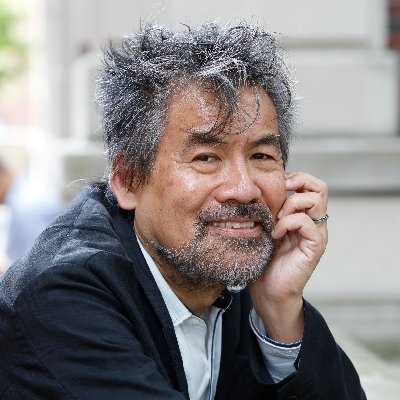
Biography
David Henry Hwang is a Tony Award Winning playwright. He has written many noteworthy and critically acclaimed plays throughout his career, including M. Butterfly, Chinglish, Yellow Face, Family Devotions, Kung Fu and Golden Child. In addition to playwriting, Hwang recently worked as a Writer and Consulting Producer on the hit Showtime series, The Affair. He also helped adapt several popular Broadway musicals, such as Disney’s Tarzan and Aida. His work has been produced on Broadway and at leading theaters including Signature Theatre, Goodman Theatre, Public Theater, Mark Taper Forum, East West Players and New Federal Theatre. Hwang graduated from Stanford University in the late 1970s with a Bachelor’s degree in English and briefly attended the Yale School of Drama for one year. Throughout his wide-ranging career, Hwang has won one Tony Award, one Drama Desk Award and three Obie Awards which recognize Off-Broadway works. He was also nominated for a Grammy Award for his most recent musical, Soft Power. As of 2021, he is a three-time finalist for the Pulitzer Prize. Additionally, he received the Guggenheim Fellowship for Creative Arts in 1984. Hwang is represented by CAA and Steven Barclay Agency. Currently, Hwang is working on the upcoming musical adaptation of Disney’s The Hunchback of Notre Dame and is the Head of Playwriting at Columbia University.
Career Highlight
David Henry Hwang currently serves as Co-Chair of the American Theatre Wing, which oversees The Tony Awards.
M. Butterfly
- Genre: Drama
- Breakdown:
- 3M Anglo, 1M Asian American, 2W Anglo, 1W Asian American, 4M/W Kurogo Dance Ensemble
- Synopsis:
- Inspired by true events and Puccini’s opera, M. Butterfly centers on Rene Gallimard, a French diplomat, who recounts how his life choices caused him to end up in a French jail. Rene experiences firsthand the wide-ranging impacts of love throughout the course of an unconventional, intercultural affair with Song, a Chinese man who performs as a woman. Through Rene’s journey that centers on love and identity, a great deal is revealed about the potential effects of stereotypes in Eastern and Western cultures.
- Development/Production History:
- M. Butterfly was originally produced in Washington D.C. at National Theatre in 1988 and moved to Broadway during the same year. The Broadway run consisted of over 750 performances and took place at the Eugene O’Neill Theatre until 1990. After the success of this play on Broadway, there were tours and performances of M. Butterfly around the world. There was a Broadway revival in 2017 at Cort Theatre.
- Link to Publisher:
- Photos from production:
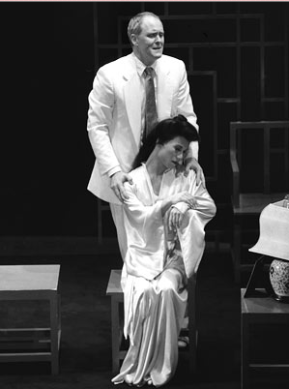
Photo Credit: The New York Times
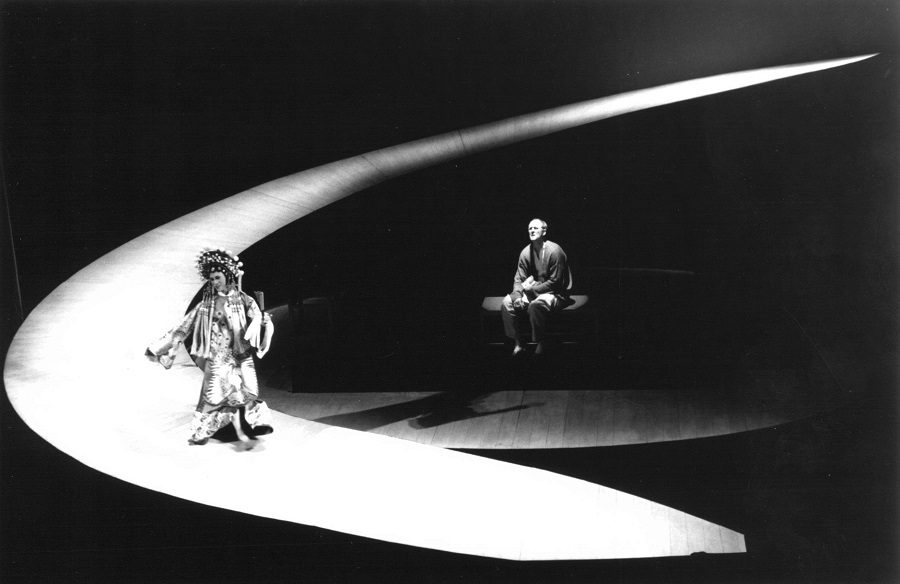
Photo Credit: David Henry Hwang Website
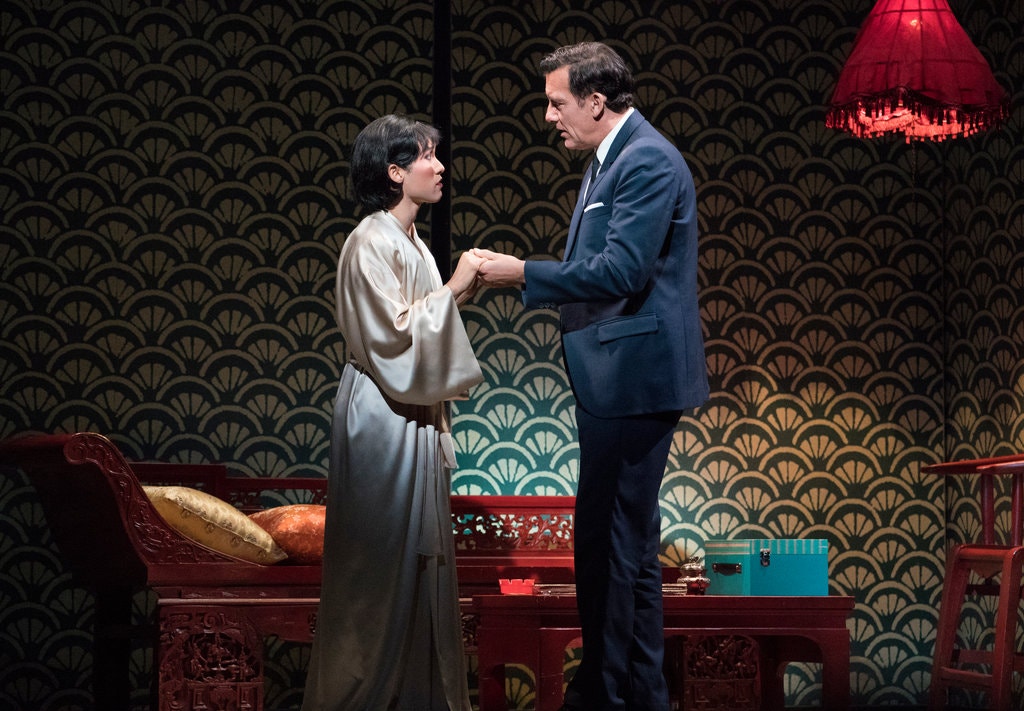
Photo Credit: The New York Times
Yellow Face
- Genre: Comedy
- Breakdown:
- 2M Asian-American, 1W Asian-American, 3M Anglo, 1W Anglo
- Synopsis:
- In this semi-autobiographical play, DHH reflects on the Miss Saigon casting controversy, which involved a white man, Jonathan Pryce, playing an Asian character. Consequently, this event significantly impacted DHH’s professional as well as personal life. By directly portraying the casting processes that perpetuate problems within the entertainment industry, DHH addresses the failure of his play, Face Value, during the 1990s. Throughout Yellow Face, DHH is able to thoroughly process what his identity as an Asian American artist means to him.
- Development/Production History:
- Yellow Face was developed at Lark Play Development Center and at Stanford Institute for Creativity in the Arts. Yellow Face premiered in Los Angeles, CA at the Mark Taper Forum in 2007. In December, Yellow Face moved to the Public Theater in New York followed by performances in London at Park Theatre and National Theatre from 2013-2014.
- Link to Publisher:
- Photos from production:
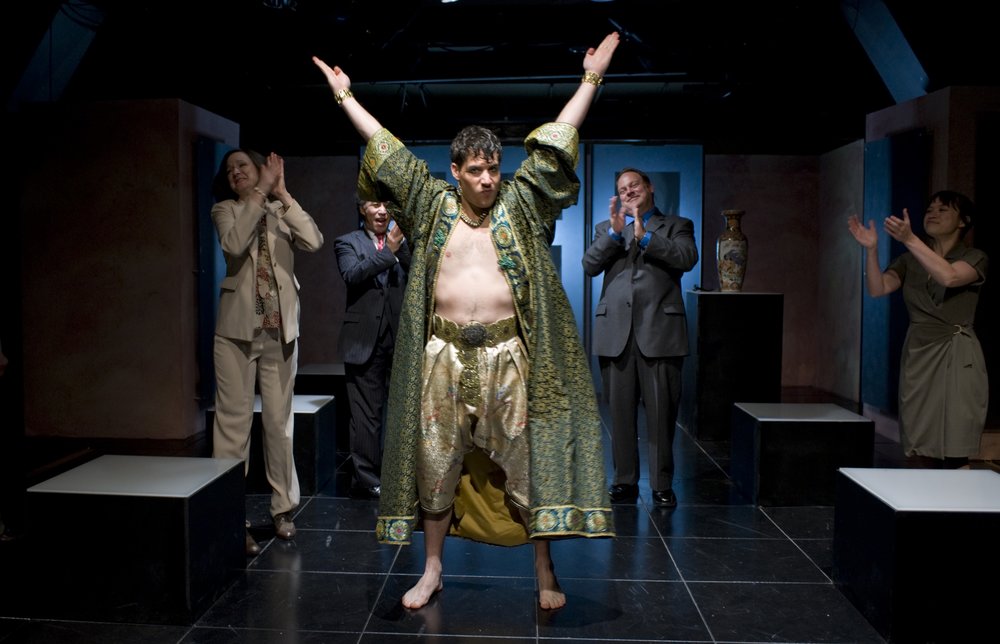
Photo Credit: David Henry Hwang Website
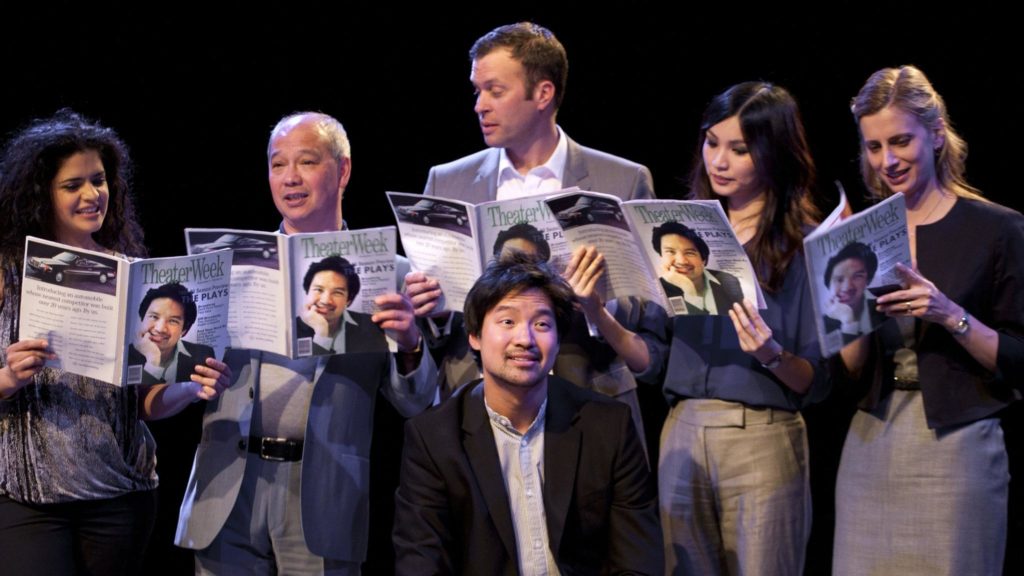
Photo Credit: Financial Times
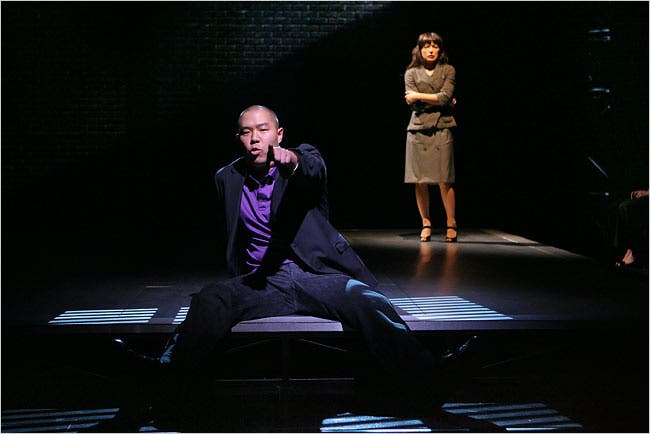
Photo Credit: The New York Times
- Plays
- 1979 – FOB
- 1981 – The Dance and the Railroad
- 1981 – Family Devotions
- 1983 – The Sound of a Voice
- 1983 – The House of Sleeping Beauties
- 1986 – Rich Relations
- 1988 – M. Butterfly
- 1992 – Bondage
- 1993 – Face Value
- 1996 – Golden Child
- 2007 – Yellow Face
- 2011 – Chinglish
- 2014 – Kung Fu
- 2017 – M. Butterfly (Revival)
- Bibliography
- Billington, Michael. “Yellow Face Review – A Probing, Political Satire on Racial Identity.” The Guardian, 12 May 2014.
- Haedicke, Janet V. “David Henry Hwang’s M. Butterfly: The Eye on the Wing.” Journal of Dramatic Theory and Criticism (1992): 27-44.
- Lee, Esther Kim. “The Theatre of David Henry Hwang.” The Journal of American Drama and Theatre 29.2 (2015): 206-207.
- McGrath, Paul D. Beyond Asian America: Resisting Modernity in the Plays of David Henry Hwang. Diss. Indiana University of Pennsylvania, 2004.
- Rich, Frank. “Review/Theater; M. Butterfly, a Story of a Strange Love, Conflict and Betrayal.” The New York Times, 21 March 1988.
- Skloot, Robert. “Breaking the Butterfly: The Politics of David Henry Hwang.” Modern Drama 33.1 (1990): 59-66.
- Web Resources
- David Henry Hwang Interview with Propeller TV, 2014
- David Henry Hwang Interview with China Personified, 2013
- Chinglish UK Production Trailer, 2017
- M. Butterfly Broadway Revival Show Clips, 2017
- American Theatre Wing Leadership – David Henry Hwang (Trustee and Co-Chair)
- David Henry Hwang Wikipedia Page
- David Henry Hwang Official Website
- David Henry Hwang Page on Playbill Website
Reflection on Contribution to Anti-Racist Theatre
David Henry Hwang has made extremely valuable contributions to Anti-Racist Theater throughout his successful career. His critically acclaimed plays, M. Butterfly and Yellow Face, address cultural complexities as well as challenges and experiences from his own life as an Asian American playwright. In the afterword of the published version of M. Butterfly, Hwang revealed that he views his playwriting as “a plea to all sides to cut through our respective layers of cultural and sexual misperception, to deal with one another truthfully for our mutual good, from the common and equal ground we share as human beings.” This approach is clearly evident throughout his body of work. In M. Butterfly, Hwang depicts life in China during the twentieth century, while also putting multiple cultures and perspectives directly in conversation with one another. Through Yellow Face, Hwang demonstrates the need for change in many facets of life, particularly within the entertainment industry. As the protagonist, Hwang bravely centers Yellow Face on himself and his own mistakes in order to allow audience members to see the areas of growth in their own lives when it comes to speaking out and preventing racial injustices. Hwang strategically utilizes many elements, including characters, music and impactful, ironic dialogue to create theatrical worlds that help expand cultural understanding.
Compiled by Caroline Cooper, American Studies and Film, Television, and Theatre, Class of 2021